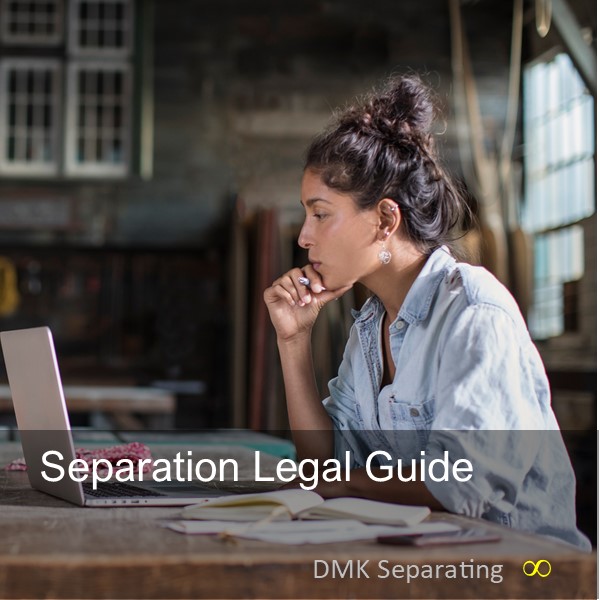2023 Separation Legal Guide Page
Legal Separation Fact During a legal separation, health insurance companies may discontinue coverage to the spouse who is not the primary insured. Check your policy for verbiage that covers marriage separation periods and/or reasons for a lapse in coverage.
- Details
- Alison Iglieski
- Separation Legal
- Hits: 2667
Do all states have the same laws regarding separation and divorce?
No. Every state has different laws regarding separation, legal separation, divorce, arbitration & mediation. Always refer to a local attorney for the specific laws in your state and how they may affect your situation. The answers in this article represent general information and can not account for every specific occurrence in any state.
Instead, use our legal guide to understand some of the "hot legal topics" associated with separation. Hopefully, these topics will provide information to discuss with your attorney as they may relate to your case.
What is the difference between a divorce, legal separation and separation?
A divorce and legal separation are somewhat similar. Read our 2019 article, Differences Between Divorce and Legal Separation. Many states require a legal separation for a term, often one year or less, prior to moving forward with divorce proceedings. Otherwise, a legal separation may be chosen instead of divorce for reasons specific to the couples circumstances (e.g. insurance, taxes, religion).
A legal separation is often so that terms of the separation are established and enforced by a court order while spouses can either prepare for divorce (possibly to satisfy a state required separation period), live separately to determine if divorce is the best action or to work on their marriage with the help of counseling and therapy.
The terms are set forth in a separtion agreement and often include financial support, child custody and living arrangements during the term of the separation. This agreement is accepted by both spouses, filed with a local family court and granted by a judge. If the couple can not come to an agreement, a judge will decide the terms.
The separation agreement is usually a good basis from which the final divorce settlement agreement is derived.
Separation refers to the time period when each spouse of a married couple lives in a separate residence or separate parts of a residence or property. It's important to not that some states do not recognize a couple as separated/legally separated when one spouse just moves to a separate part of the home or property. They most both reside in separate residences where each spouse has a separate address.
Many states require the couple file the necessary paperwork with the appropriate court in order to qualify the separation for the specified waiting period and/or to be considered a legal separation, except in states where a court order is not required. These states just require one spouse to move to a separate residence demonstrating intent for a married couple to be considered legally separated and/or as commencement of the required waiting period prior to divorce.
Refer to your attorney for details specific to the laws of your state.
Is it adultery if I have sexual relations with someone outside the marriage after I am separated?
Most states consider it adultery if, prior to the commencement of the separation, the affair began or a spouse had a dating relationship with the same person for which he/she now has a sexual or physical relationship.
However, forming a relationship with someone while divorcing may affect the overall outcome if a bitter, soon-to-be spouse decides to pursue more support and/or more favorable division of marital property or attorney's fees. This could cause a mediated or no-fault divorce to be litigated instead.
If litigated, adultery may not seem to directly affect the judge's decision, but may add some relevance and circumstances to the case that may influence the process and decision. It depends greatly on the laws of the state in which you file, the judge and circumstances of the case.
This means that instead of the spouses, mediators and/or attorneys working together to determine a settlement; the process could get drawn out for 1-3 years before finally going to divorce court and being determined by a judge.
Most judges will mostly focus on either spouse's ability of support. While an extra marital relationship may not directly link to the specific terms, the judge may subjectively consider it in his/her decision, thus affecting the outcome.
Also, if applicable, it could terminate your alimony or potential alimony if your new partner and you cohabitate. Also, if you have a legal separation agreement, check to make sure it does not have any specifications regarding new dating relationships.
It is best to avoid physical relationships with your spouse or anyone outside the marriage while separated.
What happens if my spouse and I have a sexual relationship while separated?
If there is a required separation period prior to filing for divorce in the state in which you reside; it can cause the separation period to reset. Separation is an extremely emotional time. Adding an on-again, off-again sexual relationship with your spouse can be confusing and hurtful for either of you. If one spouse feels particularly upset following the encounter, he/she could choose to be less cooperative and/or pursue a more costly and time consuming route to establish a settlement he/she feels is fair following the additional turbulence.
Also, in some cases, some spouses may lure an unsuspecting spouse back into a relationship for the purpose of manipulative measures to gain a more advantageous settlement or delay the divorce. It is possible that the new sexual relationship could be considered a breach in the separation agreement, as well. Advise your attorney immediately regarding any new situation that develops if you think it may affect your legal case.
If you both are committed to working on your relationship, you should let your attorney(s) know and ask for legal advise regarding the new relationship. This might include your attorney(s) removing your case or changing it's status to pending.
If the sexual relationship is more along the lines of occasional encounters, for the sake of your well-being, it's best not engage in a physical relationship while in the process of a divorce.
What happens if my separated spouse moves back in with me?
In most cases it will restart any necessary waiting period upon the time your spouse moves back out. Also, it will likely void any alimony and/or specifics included in the separation agreement, if there is one.
Will I lose my rights to my home if I move out?
In some states, moving out without your spouses consent, without jurisdiction and without the consent to end cohabitation would be recognized as abandonment. Abandonment may affect your portion of the equitable distribution of your home. There are exceptions based on specific reasons such as domestic violence, health or safety issues and you should check with your attorney regarding the specifics of your situation and the laws of your state.
Can I lose my personal property if I do not take it with me when I separate from my spouse?
When getting separated you should either specify in the separation agreement what personal property you wish to keep if the marriage ends in divorce or take possession of all personal property you would like to permanently keep. If your separation ends in divorce, it is common for many judges to award each spouse the personal property that is in their possession in absence of specifications in the original separation agreement.
How long can I remain legally separated?
A legal separation is usually one that is established with a court order (in most states). A separation agreement can last indefinitely and is reversible. However, most separations do end in divorce.
The wife may not be able to take back her maiden name and the property division would not be permanent unless divorced. The separation agreement would cover much of the same as a divorce settlement agreement to include support, custody and living arrangements. In most states, each spouse would not be able to remarry until divorced; but would retain tax and insurance benefit status unless noted otherwise by the health insurance provider. Some people choose to remain legally separated instead of divorced due to financial considerations such as: health insurance, taxes, social security, pension, mortgage and/or investments. Others choose this option based on religious beliefs, hopes of reconciling and/or family considerations.
Disclaimer
The information provided by respective owner's ("we", "us" or "our) on Divorce Me Knot (referenced also as "DivorceMeKnot.com", "dmk", "DMK", "OurDMK.com", "OurDMK", "application" or "site") is for general informational purposes only and is subject to change with or without notice. All information on our site and application is provided in good faith, however we make no representation, guarantee or warranty of any kind, express or implied, regarding the accuracy, validity, adequacy, reliability, availability or completeness of any information on the site or application.
The information in articles and all content on this site should not be considered psychological or behavioral health therapy, counseling or legal, financial, real estate, mortgage, insurance or professional advice. It should not be used in place of professional advice from a licensed professional or credentialed expert. Providers of content on this site, herein known as "Contributors" (inclusive of, but not limited to writers, bloggers, editors, employees, developers, graphic designers, advertisers, partners, affiliates, references, experts, professionals and site owners) are not legally liable for any misinformation, errors or omissions. Names, details and images may have been changed in the content of this site.
Under no circumstances should DMK and/or it's Contributors have any liability to users of the site for any loss or damage incurred to users as a result of the use of this site or application or reliance of any information provided on the site or application. Use of the site or application and reliance on any information from the site or application is solely at the user's own risk.
For complete site disclaimers review "Disclaimers" on this site or click the link below.
Read Complete Site Disclaimers Here







































 How to resolve AdBlock issue?
How to resolve AdBlock issue?